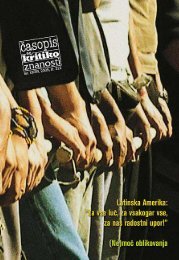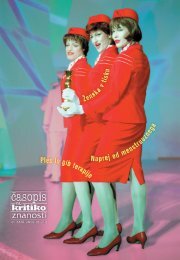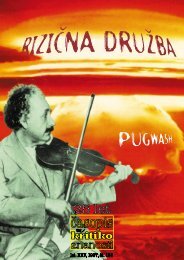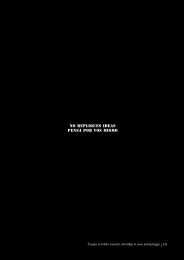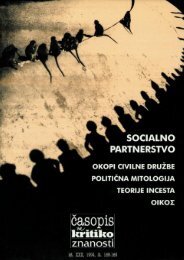izumitev politiËnega izumitev politiËnega - AirBeletrina
izumitev politiËnega izumitev politiËnega - AirBeletrina
izumitev politiËnega izumitev politiËnega - AirBeletrina
You also want an ePaper? Increase the reach of your titles
YUMPU automatically turns print PDFs into web optimized ePapers that Google loves.
142<br />
Although we have documented in this summary some of the<br />
most important conclusions of the European report it is not<br />
difficult to perceive how it was possible for the mayor and<br />
municipal administration to develop their authoritarian methods<br />
and to apply them to the project. The position of the alternative<br />
groups was exaggerated. They were “demonised” and their<br />
portrayal as a real threat to the project was nothing more than a<br />
carnivalesque game. The European Report comments that<br />
independent Slovenia succeeded in the nineties in completely<br />
paralysing the “alternative culture” that had enjoyed such a<br />
fruitful existence in the eighties.<br />
In this respect it is possible to state that such drastic general<br />
(thah such drastic general tendencis) tendencies in the<br />
Slovenian cultural policy provided a fruitful terrain for the<br />
complete obstruction of the first conceived phase of The<br />
European Cultural Month – Ljubljana 97 (from the 1st of March<br />
1995 to the 1st of March 1996).<br />
Another tendency or direction was individuated by the<br />
experts in the cultural and artistic strategies supported by the<br />
Slovenian Ministry of Culture. A turn towards the direction of<br />
traditional art and culture or what is understood as the high<br />
European humanistic tradition in art and culture. For Slovenia this<br />
represents a radical turning point. This tendency – is radically<br />
different from the flourishing modern and experimental art and<br />
cultural productions in Slovenia of the eighties.<br />
According to the European report, the imaginary humanist<br />
art tradition is the way in which art and culture (i.e. against<br />
modern and experimental production) is redirect in Slovenia.<br />
This tendency is clearly reflected also in the programme peaks<br />
of the European Cultural Month – Ljubljana 97 conceived after<br />
the 1st of March 1996, i.e. after the obstruction of the first phase<br />
of the project.<br />
This is why articles analysing the European Cultural Month –<br />
Ljubljana 97, with reference to the works by Homi Bhabha,<br />
Ernesto Laclau, Alain Badiou, Jelica [umi~-Riha etc., recognise<br />
that the European Cultural Month – Ljubljana 97 is of strategical,<br />
cultural and theoretical importance. Such writings seek to foster<br />
the development of critical readings of the general principles of<br />
the Slovenian cultural policy and also to encourage the<br />
development of new perspectives, options and hypothesis for<br />
progressive cultural and artistic strategies in a future Slovenia.<br />
EMK – LJUBLJANA 97




